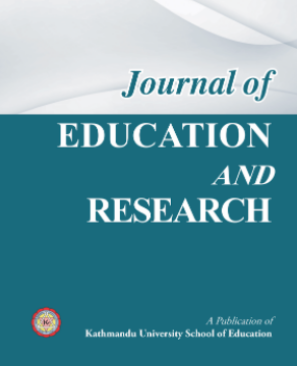
Constructivist Grounded Theory Practice in Accountability Research
Original Article
Journal of Education and Research, Volume 8, Issue 1, 2018, 61-88, https://doi.org/10.3126/jer.v8i1.25480
Publication date: Mar 15, 2018
Views: 555 | Downloads: 790
How to cite this article
APA
In-text citation: (Khanal, 2018)
Reference: Khanal, K. P. (2018). Constructivist Grounded Theory Practice in Accountability Research. Journal of Education and Research, 8(1), 61-88. https://doi.org/10.3126/jer.v8i1.25480
Reference: Khanal, K. P. (2018). Constructivist Grounded Theory Practice in Accountability Research. Journal of Education and Research, 8(1), 61-88. https://doi.org/10.3126/jer.v8i1.25480
Vancouver
In-text citation: (1), (2), (3), etc.
Reference: Khanal KP. Constructivist Grounded Theory Practice in Accountability Research. Journal of Education and Research. 2018;8(1):61-88. https://doi.org/10.3126/jer.v8i1.25480
Reference: Khanal KP. Constructivist Grounded Theory Practice in Accountability Research. Journal of Education and Research. 2018;8(1):61-88. https://doi.org/10.3126/jer.v8i1.25480
AMA
In-text citation: (1), (2), (3), etc.
Reference: Khanal KP. Constructivist Grounded Theory Practice in Accountability Research. Journal of Education and Research. 2018;8(1), 61-88. https://doi.org/10.3126/jer.v8i1.25480
Reference: Khanal KP. Constructivist Grounded Theory Practice in Accountability Research. Journal of Education and Research. 2018;8(1), 61-88. https://doi.org/10.3126/jer.v8i1.25480
Chicago
In-text citation: (Khanal, 2018)
Reference: Khanal, Kul Prasad. "Constructivist Grounded Theory Practice in Accountability Research". Journal of Education and Research 2018 8 no. 1 (2018): 61-88. https://doi.org/10.3126/jer.v8i1.25480
Reference: Khanal, Kul Prasad. "Constructivist Grounded Theory Practice in Accountability Research". Journal of Education and Research 2018 8 no. 1 (2018): 61-88. https://doi.org/10.3126/jer.v8i1.25480
Harvard
In-text citation: (Khanal, 2018)
Reference: Khanal, K. P. (2018). Constructivist Grounded Theory Practice in Accountability Research. Journal of Education and Research, 8(1), pp. 61-88. https://doi.org/10.3126/jer.v8i1.25480
Reference: Khanal, K. P. (2018). Constructivist Grounded Theory Practice in Accountability Research. Journal of Education and Research, 8(1), pp. 61-88. https://doi.org/10.3126/jer.v8i1.25480
MLA
In-text citation: (Khanal, 2018)
Reference: Khanal, Kul Prasad "Constructivist Grounded Theory Practice in Accountability Research". Journal of Education and Research, vol. 8, no. 1, 2018, pp. 61-88. https://doi.org/10.3126/jer.v8i1.25480
Reference: Khanal, Kul Prasad "Constructivist Grounded Theory Practice in Accountability Research". Journal of Education and Research, vol. 8, no. 1, 2018, pp. 61-88. https://doi.org/10.3126/jer.v8i1.25480
ABSTRACT
This article offers the application of constructivist grounded theory in inquiring dimensions of accountability in education. The classical version of grounded theory, which was aligned with the positivist epistemology, has been well discussed in qualitative research. However, the constructivist version of grounded theorizing concerning education has not been adequately articulated in the existing literature. In response to this methodological gap, this paper discusses the canons of constructivist grounded theory in reference to inquiring school actors’ accountability for service delivery in education. The paper draws empirical evidence from the author’s study conducted in the context of community schools in Nepal. The paper argues that theory construction in constructivist grounded theory design is accomplished through the interaction of both data-indicated and extant theoretical concepts by integrating inductive, abductive and deductive reasoning during various stages of the inquiry. The paper also argues that, in constructivist grounded theory, it is not the data saturation as such but the level of researcher’s satisfaction where the grounded theorizing terminates. The paper concludes that the constructivist epistemology of grounded theorizing is useful in addressing the localized understanding of accountability in the decentralized context of education governance in Nepal.
KEYWORDS
REFERENCES
---
LICENSE
This work is licensed under a Creative Commons Attribution 4.0 International License.
